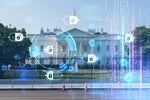What exactly will the UK government's global AI Safety Summit achieve?

From tomorrow, the UK government is hosting the first global AI Safety Summit, bringing together about 100 people from industry and government to develop a shared understanding of the emerging risks of leading-edge AI while unlocking its benefits.
The event will be held at Bletchley Park, a site in Milton Keynes that became the home of code breakers during World War II and saw the development of Colossus, the world’s first programmable digital electronic computer, used to decrypt the Nazi Party’s Enigma code, shortening the war by at least two years.






